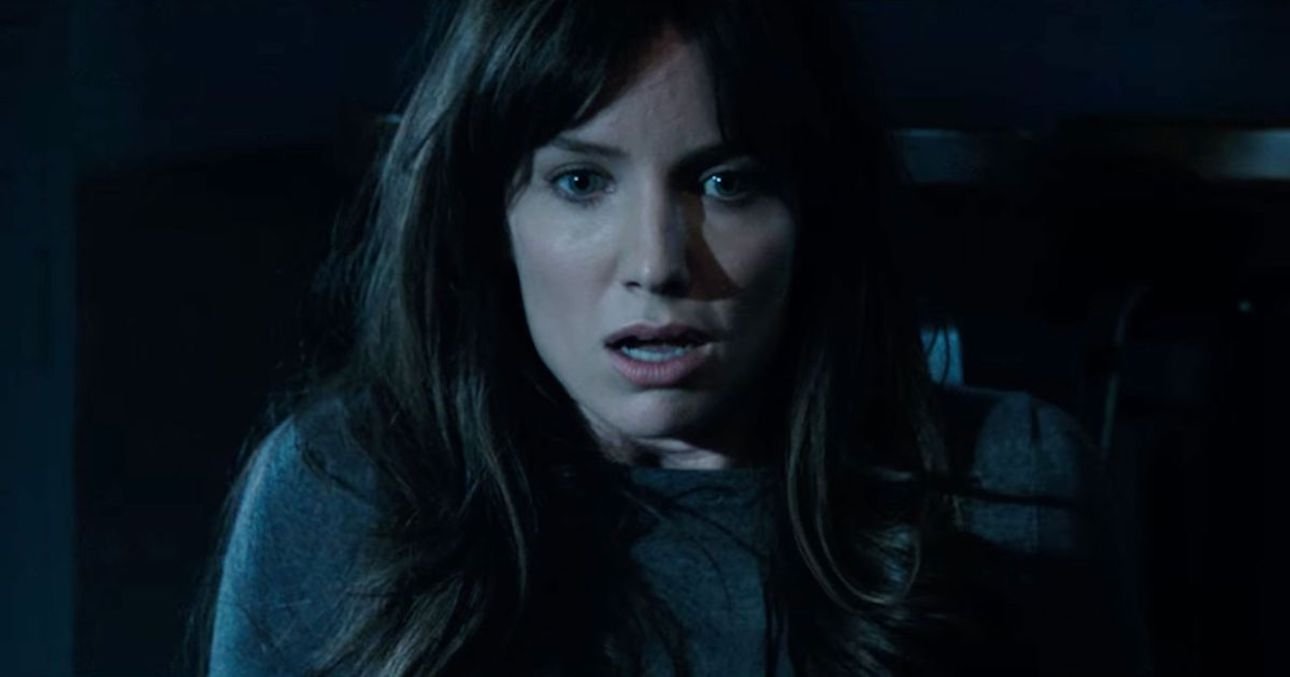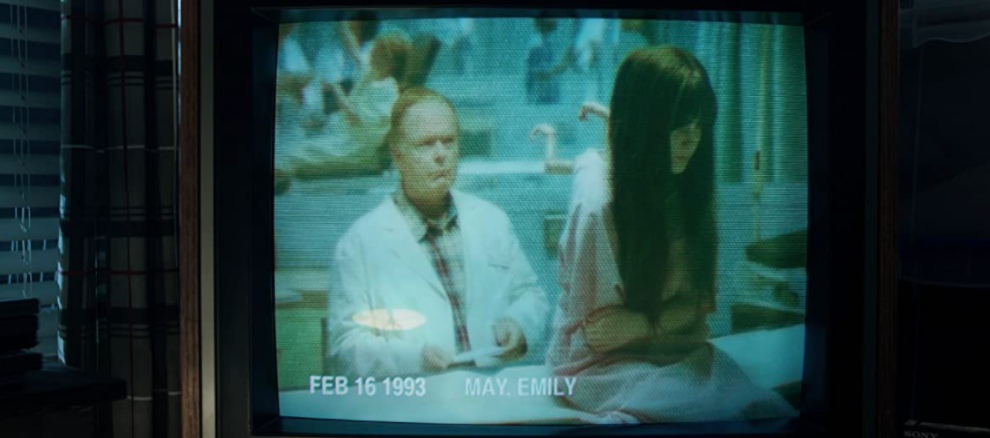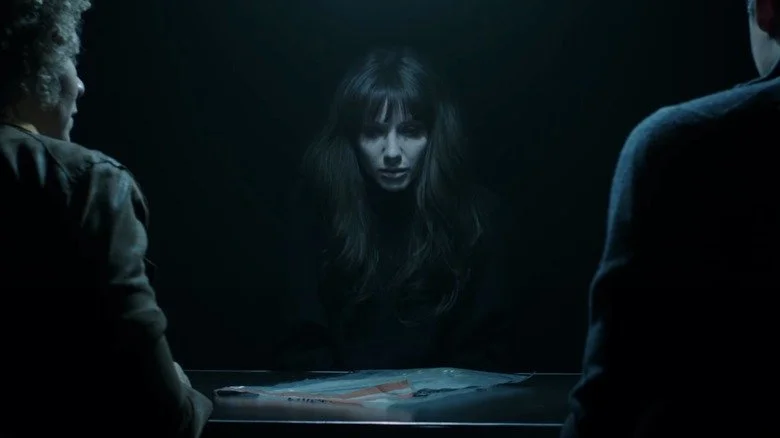[Editorial] Taking Back Control: Women Empowerment in Malignant (2021)
This editorial contains spoilers! Trigger warning: Subjects such as miscarriage, physical abuse, and abortion are within this editorial
Malignant (2021) braved the big screen recently, introducing a grungy new horror full of energy and fun. Director James Wan teams up with Akela Cooper and Ingrid Bisu to deliver a nostalgic horror that turns the classic trope of ‘the final girl’ on its head. Malignant follows Madison (Annabelle Wallis) who begins to experience sleep paralysis with visions of gruesome murders.
Madison finds herself trapped and isolated by an abusive husband who sets free a demon from Madison’s past. With little help from the police, Madison finds the answers through old VHS tapes and her adoptive sister’s expert sleuthing. She rediscovers that her brother Gabriel was once conjoined to the back of her head. In an effort to help Madison and Gabriel, the pair undergo intense experimentation, but ultimately Gabriel is removed and shut away due to his evil parasitic ways. A slight remnant of Gabriel ends up closed into Madison’s brain for her to survive, but after years of living her life, Madison learns she has been within Gabriel’s grip all along. Malignant may have been messy in its delivery, but deep within is something more significant. Malignant presents a story rooted in fighting back against patriarchal control and domination. Since the philosophical time of Sigmund Freud and his Oedipus complex, women have been a feared symbol of male societal rules. Women were used as the symbol of “castration anxiety”, which would later evolve and translate to how women are presented on screen. To dilute such threats, women were often portrayed as villains and fetishized for their beauty, thus creating a long history of femme fatales and bombshells. The idea that men were and are the only audience for movie viewing, this long-winded theory would go on to create objectification of women, stereotypes, and restrictions upon them. Malignant takes this and creates a film where the men are evil, and the female body is not one for gawking but for fighting.
This narrative may be no stranger to horror fans especially in the wake of recent events, including my home state of Texas. Women have always been under scrutiny for their choices, what they wear, say, hobbies, and their desires. Extraordinary abilities like pregnancy turned on women as an unnecessary evil brought upon by themselves. Malignant takes these hardships and shows us empathy in motherhood, bravery in found family, and power in a woman’s mind. Men have forever dominated the world through what we know as the Patriarchy. This term has been made fun of, not taken seriously, and feels a tad bit like slander, but it is very well alive and has evolved its traditional meaning to remain relevant. It is simply a system of domination created and run by powerful men, which uses violence and the threat of violence to enforce control on women, children, nature, and even other men. This system is known as patriarchal control, and Malignant represents this system through Madison’s abusive husband Derek (Jake Abel) and her parasitic twin Gabriel. In the beginning, we meet a pregnant Madison who comes home from work to her husband laying in bed watching sports. Their dialogue begins regularly until Madison speaks of discomfort from her pregnancy, revealing Derek’s true colors. He towers over her, asserting his dominance, and talks down to her about how she wouldn’t be uncomfortable if she just “stopped getting pregnant”. Continuing that she breaks his heart when his child dies “inside of her”. His comments are powerful in keeping Madison in place, as he plays on her fears of miscarrying again and points all the blame on her for those lost pregnancies, a selfish and damaging claim to make. Although hard to place oneself in Madison’s position, it is not hard to imagine the amount of guilt she felt already as she wants so badly to have a baby, and Derek knows this and uses it against her. His control over her is just the tip of the substantial patriarchal iceberg within Madison’s existence. Derek’s comments then turn to physical abuse, and although Madison attempts to protect herself and her baby, Derek retaliates, leading to a busted head and the subsequent escape of Gabriel.
The release of Gabriel begins his mean streak as he kills off Derek and attacks Madison, causing another miscarriage. Madison is now alone, or so Gabriel wishes. In the wake of a traumatic moment, Madison’s adoptive sister Sydney (Maddie Hasson) never leaves her side, wanting to help the most she can. In the aftermath, Madison confesses to her sister that she went through many miscarriages and could never find the strength to leave Derek. Madison blames herself for not being able to have a baby and tries to explain to Sydney that she just wanted a blood connection; she then confesses that she was adopted. Madison knows little of her past at this point, but her general feelings of abandonment and fear are now more apparent than ever, feelings and fears she can’t control. Madison’s lack of control is the constant for her, and it starts at birth. We learn through Sydney's research that Madison was the child of a fifteen-year-old who was raped. On top of this, she was born with a brother, Gabriel; attached to Madison, Gabriel was not fully formed and needed her body to survive. Madison’s birth mother surrendered Madison and Gabriel to the Simion Research Hospital. In an attempt to help Gabriel live independently, he grows supernatural powers to control electric energy and uses Madison’s body as a puppet to enact violence. This gruesome violence leads to his removal, and the first time he is referred to as cancer. Although the audience discovers this information before Madison, it is a massive revelation about how Madison became the person she is. VHS home videotapes and flashbacks further reveal that even upon his removal and Madison’s adoption, she is still under the influence and control of Gabriel’s evil ideas and motives. Using her to commit heinous acts against her adoptive family and keep her self-esteem low. This male domination through Gabriel onto Madison is a symbol of patriarchal control. Even in the shadows of her mind Gabriel continues his work, and Madison follows in his lead by remaining in another equally abusive relationship having known no other way since birth. The idea of a child born from rape being an abomination is instilled within Madison without her knowing. Gabriel is just the manifestation of the abomination that is patriarchal control constantly lingering and latched upon women.
Sharing the same brain, Madison and Gabriel are one within her body. Still, Gabriel’s supernatural abilities give him a unique power to overtake Madison’s body, creating out-of-body-like experiences for Madison. This leads to making her look, sound, and even feel crazy as she attempts to get help from authorities, this toxic manipulation is part of gaslighting Madison into believing it is all in her head and her fault. Her self-doubt is Gabriel’s most significant trick to remaining in control; as long as Madison believes she is helpless, Gabriel grows stronger. Following the journey to finding the truth behind Gabriel, Madison revisits family home videotapes and a hypnosis shrink to help her remember. Through this, Madison sees that even as a child, she communicated with Gabriel and bargained with him to keep him at bay. Because of Gabriel, Madison has suppressed the experience of being tested on, tranquilized, and strapped to chairs within the research hospital. On the other hand, Gabriel holds onto these moments as reasoning for his devious acts and, more importantly, blames Madison for abandoning him as his sister and ‘choosing’ a different family. This hatred and adolescent thinking strengthen the choke hold that is masculine domination. As for Gabriel, all of Madison’s life he led her to believe that she is living a normal life but has been using her body as a puppet. Pushing her down deep within her own consciousness, a prisoner within her own body.
The patriarchy expects women to fall in line and never question anything, just as Gabriel expected Madison never to fight back. Submission of this kind is achieved by years of conditioning; like Madison, many women can recall moments from childhood, ads in magazines, and television programs that created submissive habits. From fashion trends, diet culture to photoshopped models, women are preyed upon by mass media to instill unnecessary fears, thus deepening the claws of control within them. Men will never be able to place themselves within women’s shoes and fathom the choices and battles women face. Yet, this never seems to stop men from making decisions for women. In my home state of Texas, Governor Greg Abbott signed a bill that went into effect September 1st, famously known as the Texas Heartbeat Bill. This legislation simply states that Texas bans women from receiving an abortion after six weeks of pregnancy because a fetal heartbeat is detected. Unfortunately, as many women are probably aware, six weeks is not enough to know that you are pregnant. This bill also has no exceptions for victims of rape or incest. When asked about this, governor Greg Abbott replied, “Texas will work tirelessly to make sure that we eliminate all rapists from the streets of Texas by aggressively going out and arresting them and prosecuting them and getting them off the streets.” In my personal experience, men who rape women are usually already in her circle or in her home closer than we believe. This intrusion on women and control leads to a narrative suggesting that women do not know how to take care of themselves or make their own decisions. Malignant brought to light this topic in a new way, a power struggle women are still battling in the 21st century. Like Gabriel, these politicians believe that women will not push back and question the motives behind such controlling legislation. And like Madison, women all over are waking up and picking a fight with the patriarchy.
In the end, Madison’s realization that Gabriel has been the cause of all her sorrow and pain awakens her to learn that she, too, harnesses the same power as him. Madison finds the strength to take back her mind and use Gabriel’s tricks against him is what sets her free. This idea is the most vital point of the film and the strongest weapon women have—bodily autonomy, thoughts, opinions, ideas, and so much more. Women are the center of this universe, life simply would not exist without them, and it is that power that drives fear into a male-dominated society to use brute strength to control such power. So what do we take from this? It has been too long that women remain under the lens of objectification. Women are human before they are women and have so much to bring to this world outside of procreation and home-cooked meals. Malignant may not be the best movie of the year or win any academy awards but, the voices of artists Akela Cooper and Ingrid Bisu bring a damn scary concept forward. It was not just another slasher or monster; it was a creative take on internalized hatred and patriarchal control. Horror has been the catalyst for using its unique rule-breaking style to talk about topics everyone else won’t. Nia Dacosta did it with this year’s release of Candyman (2021), Diablo Cody did it with Jennifer’s Body (2009), Mary Harron with American Psycho (2000), and so many more women deserve to have their voices heard in this way. Malignant was gory, fun, and powerful, and it’s about damn time we take back control.







![[Editorial] In Her Eyes: Sara Lowes in Witchfinder General (1968)](https://images.squarespace-cdn.com/content/v1/5fe76a518d20536a3fbd7246/1655655953171-8K41IZ1LXSR2YMKD7DW6/hilary-heath.jpeg)
![[Editorial] The Babadook (2014)](https://images.squarespace-cdn.com/content/v1/5fe76a518d20536a3fbd7246/1651937631847-KR77SQHST1EJO2729G7A/Image+1.jpg)
![[Editorial] In Her Eyes: Helen Lyle in Candyman (1992)](https://images.squarespace-cdn.com/content/v1/5fe76a518d20536a3fbd7246/1649586854587-DSTKM28SSHB821NEY7AT/image1.jpg)
![[Editorial] Lorraine Warren’s Clairvoyant Gift](https://images.squarespace-cdn.com/content/v1/5fe76a518d20536a3fbd7246/1648576580495-0O40265VK7RN03R515UO/Image+1+%281%29.jpg)
![[Editorial] Sara in Creep 2 (2017)](https://images.squarespace-cdn.com/content/v1/5fe76a518d20536a3fbd7246/1646478850646-1LMY555QYGCM1GEXPZYM/27ebc013-d50a-4b5c-ad9c-8f8a9d07dc93.jpg)
![[Editorial] Sally Hardesty in The Texas Chainsaw Massacre (1974)](https://images.squarespace-cdn.com/content/v1/5fe76a518d20536a3fbd7246/1637247162929-519YCRBQL6LWXXAS8293/the-texas-chainsaw-final-girl-1626988801.jpeg)
![[Editorial] Margaret Robinson: Hammer’s Puppeteer](https://images.squarespace-cdn.com/content/v1/5fe76a518d20536a3fbd7246/1630075489815-33JJN9LSGGKSQ68IGJ9H/MV5BMjAxMDcwNDI2Nl5BMl5BanBnXkFtZTcwOTMxODgzMQ%40%40._V1_.jpg)
![[Editorial] Re-assessing The Exorcist: Religion, Abuse, and The Rise of the Feminist Mother.](https://images.squarespace-cdn.com/content/v1/5fe76a518d20536a3fbd7246/1629995626135-T5K61DZVA1WN50K8ULID/image2.jpg)
![[Editorial] Unravelling Mitzi Peirone’s Braid (2018)](https://images.squarespace-cdn.com/content/v1/5fe76a518d20536a3fbd7246/1628359114427-5V6LFNRNV6SD81PUDQJZ/4.jpg)
![[Editorial] American Psycho (2000)](https://images.squarespace-cdn.com/content/v1/5fe76a518d20536a3fbd7246/1627317891364-H9UTOP2DCGREDKOO7BYY/american-psycho-bale-1170x585.jpg)














![[Editorial] Oscar Nominations 2026: Where to stream all the horror picks](https://images.squarespace-cdn.com/content/v1/5fe76a518d20536a3fbd7246/1769113319180-4INRRNMZK4DZLHRSUXX5/rev-1-GRC-TT-0026r_High_Res_JPEG-1024x372.jpeg)
![[Editorial] 10 Films & Events to Catch at Soho Horror Film Fest 2023](https://images.squarespace-cdn.com/content/v1/5fe76a518d20536a3fbd7246/1700819417135-299R7L4P0B676AD3RO1X/Screenshot+2023-11-24+at+09.41.52.png)
![[Editorial] 9 Horror Nintendo Switch Games To Play](https://images.squarespace-cdn.com/content/v1/5fe76a518d20536a3fbd7246/1697214470057-3XZXX8N4LYIMDFWS6Z3P/Screenshot+2023-10-13+at+17.20.13.png)
![[Mother of Fears] Mothering in Silence in A Quiet Place (2018)](https://images.squarespace-cdn.com/content/v1/5fe76a518d20536a3fbd7246/1696445921315-HZJ2DZYQIH6VVWXBO2YL/Screenshot+2023-10-04+at+19.52.29.png)
![[Editorial] 5 Female Focused Horror Book Recommendations](https://images.squarespace-cdn.com/content/v1/5fe76a518d20536a3fbd7246/1696441981361-52EQCTJ7AT2QF1927GM7/919xtm6d3fL._AC_UF894%2C1000_QL80_.jpg)
![[Editorial] 9 Best Slashers Released Within 10 Years of Scream (1996)](https://images.squarespace-cdn.com/content/v1/5fe76a518d20536a3fbd7246/1695478839037-LOFHGVM3H6BMSZW7G83M/Screenshot+2023-09-23+at+15.15.11.png)
![[Mother of Fears] Mother Vs. Monster in Silent Hill (2006)](https://images.squarespace-cdn.com/content/v1/5fe76a518d20536a3fbd7246/1695485781119-H6GNP0G3J2TLPAOIABV7/Screenshot+2023-09-23+at+17.11.56.png)
![[Editorial] 9 Terrifying Cerebral Visions in Horror Movies](https://images.squarespace-cdn.com/content/v1/5fe76a518d20536a3fbd7246/1693509801235-X23OL50T1DVGECH0ZJK2/MV5BMjQ0MTg2MjQ4MV5BMl5BanBnXkFtZTgwMTU3NDgxMTI%40._V1_.jpg)

Possessor is a slick futuristic thriller in which Tasya Vos, an assassin for hire, must manage her responsibilities as an elite killing machine and complex feelings towards her husband and son, whilst taking on another high-profile job that will push her to the edge of her sanity.